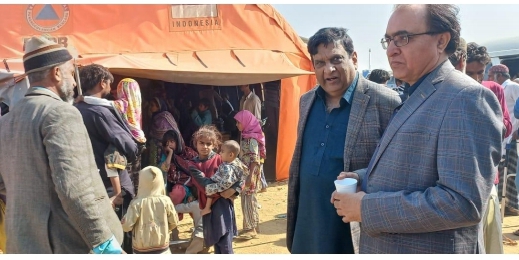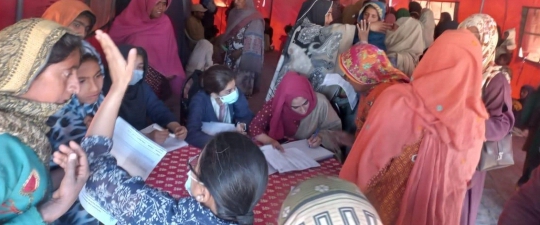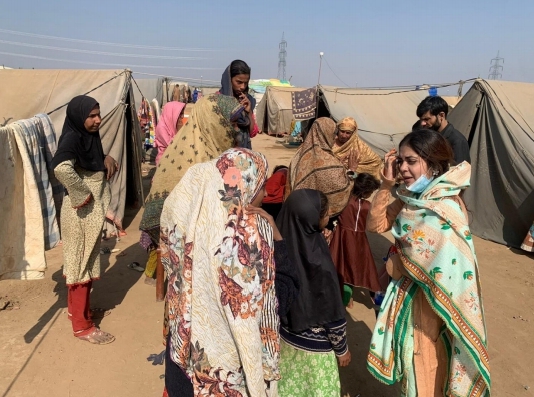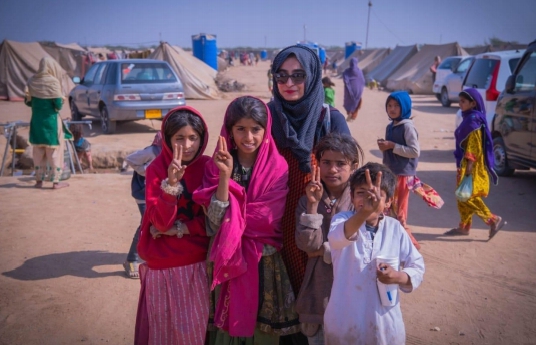
The recommendations are the part of the report on the activities of International Medical Corps, compiled by Sindh Mental Health Authority
Sindh Courier Report
Karachi
The experts of International Medical Corps have recommended that the Government of Sindh and Health Department require devising the effective short-term and premeditated long-term strategies to mitigate the problems associated with natural calamities.
The recommendations are the part of the report on the activities of International Medical Corps, compiled by Sindh Mental Health Authority (SMHA).
 The SMHA, in collaboration with the International Medical Corps and other stakeholders had organized Mental Health Camps for flood and rain-Affected population of Sindh at Mega Tent City, Malir at the link road of Gulshan-e-Hadeed Karachi on January 7, 2023. The other stakeholders included Department of Psychiatry and Behavioral Sciences JPMC, Department of Psychiatry, Civil Hospital Karachi, Institute of Clinical Psychology, University of Karachi, Bahria University, and Hamdard University, Karachi.
The SMHA, in collaboration with the International Medical Corps and other stakeholders had organized Mental Health Camps for flood and rain-Affected population of Sindh at Mega Tent City, Malir at the link road of Gulshan-e-Hadeed Karachi on January 7, 2023. The other stakeholders included Department of Psychiatry and Behavioral Sciences JPMC, Department of Psychiatry, Civil Hospital Karachi, Institute of Clinical Psychology, University of Karachi, Bahria University, and Hamdard University, Karachi.
Most patients were seen to have Depression (32%), followed by Mental Retardation (14.4%), Epilepsy (11.2%) and Somatoform disorders (11.2%)
The one-day mental health camp aimed at identifying, screening, diagnosing, and treating survivors with mental health problems, however general medical issues including neurological and other illnesses were also consulted and referrals were ensured accordingly.
Most patients were seen to have Depression (32%), followed by Mental Retardation (14.4%), Epilepsy (11.2%) and Somatoform disorders (11.2%). A lesser number of patients were diagnosed with anxiety disorder, substance use disorder, schizophrenia and bipolar disorder. Among the total 2915 patients 51.7% were males and 48.3% were females. The average age of the patients present at the camp was between 30-55 years.
The experts in the light of their observations recommended setting up of disaster relief cell, having linkages with national and international organizations, to prioritize activities under the short, intermediate and long term plan.
The experts also suggested coordination of relief activities between the government and international community and NGOs/INGOs.
 It was further recommended to carry out a need assessment survey to identify vulnerable communities; monitoring the situation which arises in natural disaster and life in shelters; water born & infectious diseases, rationing of food and essential life provisions, managing supply chain & storages, law and order, running clinics and dispensaries smoothly.
It was further recommended to carry out a need assessment survey to identify vulnerable communities; monitoring the situation which arises in natural disaster and life in shelters; water born & infectious diseases, rationing of food and essential life provisions, managing supply chain & storages, law and order, running clinics and dispensaries smoothly.
Moreover, training of staff & doctors in identifying/treating/ referring priority health conditions; developing protocols for the management of Acute Stress Disorder & Post-traumatic Stress Disorder, Depression & Anxiety, Somatoform Disorders, Psychotic Disorders, Substance Use Disorders; Identification of special groups or vulnerable population – Women & Children, Geriatric population etc. was also recommended.
The recommendations called for phase-wise return and rehabilitation of the population in need and resource mobilization to support the activities; provision of essential medications; hiring of trained manpower (doctors, nurses, ancillary care staff) to continue with services in remote parts of the province; hiring of consultants and experts (from International Agencies, like WHO, UNO, UNICEF, USAID, DFID, Aga Khan Foundation, etc.) to design, oversee & implement the activities.
The report also stressed addressing the urban-to-rural migration which has the potential to change the social epidemiology, disease patterns, infectious diseases, and nutritional status of vulnerable populations.
The experts in their observations said that most of the people at Tent City reported having headache, and symptoms of post-traumatic stress including dizziness, palpitations and fainting spells. Lack of interest and feeling low, mood swings and sleep disturbance were also common. Some of them had negative thinking, stress, anger and helplessness.
 Food deprivation (1 or 2 meal only), Anemia in women and malnutrition especially in children, difficulty due to lack of clean water facility at camp site were also reported.
Food deprivation (1 or 2 meal only), Anemia in women and malnutrition especially in children, difficulty due to lack of clean water facility at camp site were also reported.
Besides physical illness, hyper tension, and skin diseases were majorly reported. General health of women and children affected due to early marriages, less gap between pregnancy, and high number of children was also observed.
It was strongly recommended that government should take active steps to provide basic facilities including education, clean water, resources for work/ jobs, as most women are skilled in hand crafts and men expressed agreement for doing any kind of work.
Health facilities especially mental health facilities (Psychiatrist, and Clinical psychologist, or a counselor) should be provided at least once a week, the experts urged and said that qualified and trained professionals should be encouraged to participate in these activities.
______________